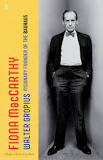Christopher Turner at Literary Review:
 Fiona MacCarthy met Walter Gropius (1883–1969) through Jack Pritchard, the British entrepreneur who built Lawn Road Flats in Hampstead, an experiment in modernist living where Gropius took up residence after escaping Nazi Germany in 1934. The Bauhaus, the school he founded in Weimar a century ago this year, had been closed by stormtroopers the previous year (by then it had moved to Berlin). In 1968, after the opening of a Bauhaus exhibition at the Royal Academy, MacCarthy was invited to dinner with Gropius at the Lawn Road Isobar, the block’s in-house dining room: ‘He was then eighty-five, small, upright, very courteous, retaining a Germanic formality of bearing,’ MacCarthy recalled. He ‘was still valiant and impressive, with a flickering of arrogance’.
Fiona MacCarthy met Walter Gropius (1883–1969) through Jack Pritchard, the British entrepreneur who built Lawn Road Flats in Hampstead, an experiment in modernist living where Gropius took up residence after escaping Nazi Germany in 1934. The Bauhaus, the school he founded in Weimar a century ago this year, had been closed by stormtroopers the previous year (by then it had moved to Berlin). In 1968, after the opening of a Bauhaus exhibition at the Royal Academy, MacCarthy was invited to dinner with Gropius at the Lawn Road Isobar, the block’s in-house dining room: ‘He was then eighty-five, small, upright, very courteous, retaining a Germanic formality of bearing,’ MacCarthy recalled. He ‘was still valiant and impressive, with a flickering of arrogance’.
Gropius, who died nine months later, split his life into three acts, obligingly providing the overall structure for MacCarthy’s biography. He started out as a radical, avant-garde architect in Germany, working for Peter Behrens alongside Le Corbusier and Mies van der Rohe, before founding the Bauhaus; he then fled Nazi Germany to Britain, where he became a leading advocate of modernism but struggled to build anything of substance or replicate his school; finally, he emigrated to America, where he was feted and taught a new generation of architects at Harvard, thereby exerting enormous influence.
more here.
